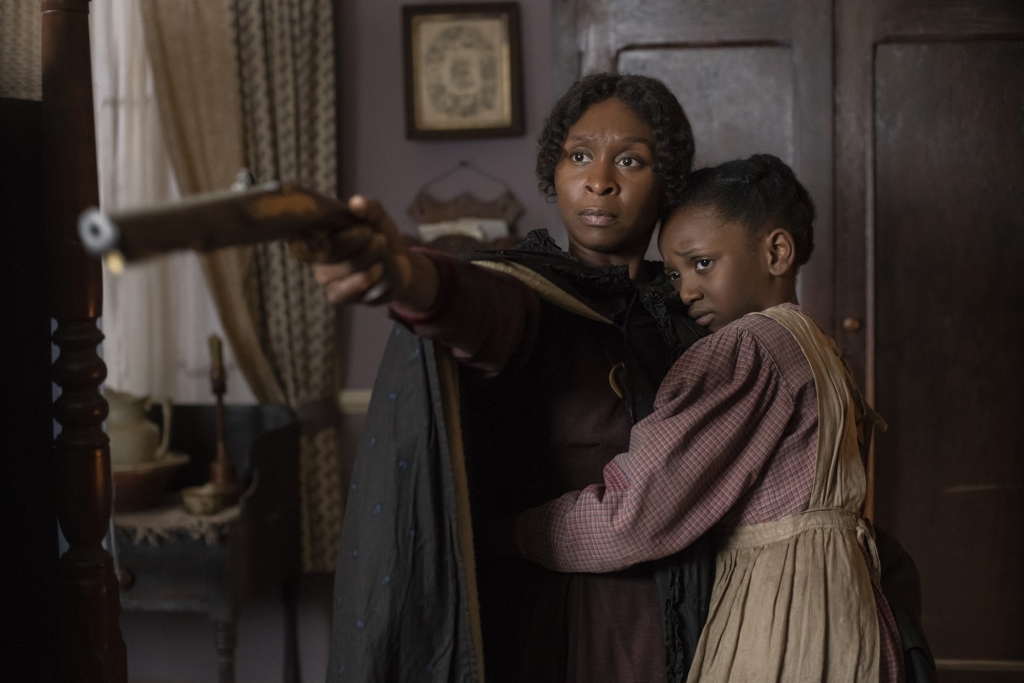Though the pendulum has been swinging for some time now, historical biopics about black women are rare. It must be said, though, that this one’s been coming for a while now. The story of Harriet Tubman – probably the most legendary “conductor” on the Underground railroad – is one that practically screams out for the silver screen treatment. A woman born into slavery, Tubman – born Araminta “Minty” Ross – managed to escape her bondage, traveling over a hundred miles to Philidelphia, and then more or less immediately turned right around, heading back into enemy territory to liberate as many slaves as possible.
I’ll say this; if you’re planning on seeing Harriet just to escape the recent deluge of comic book adaptations, save your money. Harriet goes out of its way to take this extraordinary, real-life hero, and strip her of every possible human frailty, until eventually turning her into a literal superhero.
The first scene of the film begins this two-hour long lionization of Tubman. We see her as a young woman, still enslaved, in the throes of one of her “spells,” a kind of trance-like state she frequently enters throughout the movie, one which apparently allows her to see memories from the past and visions of the future. Tubman, a deeply religious woman, is convinced that the spells are caused by divine intervention, and for all intents and purposes the film agrees with her. What else are we to make of the scene where, when escaping through the woods with most of her family in tow, she enters a trance, and then somehow intuits that the path they’re on will lead them into a trap?
The film continues in this fashion, never passing up an opportunity to raise Tubman up on the highest of pedestals. The obvious question here is, so what? What’s the problem? If ever there was a historical figure that deserves lionization in the extreme, shouldn’t it be Harriet Tubman?
My issues with Harriet aren’t so much that it plays up the heroic nature of her actions – a seemingly impossible task that the film somehow accomplishes anyway – but more that it systematically removes every single source of hardship from her life. Tubman never seems to encounter any real hardship, or at least any kind of hardship that poses any kind of an obstacle for her. The film pays lip service to the horrors of slavery, familial abandonment, and the perils of long travel, without immersing us in either. As such, it took what is to my mind a truly breathtaking real-life experience, and made it honestly pretty boring. Why should I care what happens to this woman when she’s never presented as being in any danger at any point in time?
This is a very poorly paced film. It’s just over two hours long, but it still feels improbably rushed, almost like it’s missing several reels. The editor, Wyatt Smiths, pieces Harriet together in a way that seems to actively thwart investment; we’re never in any one location for long enough to get invested, either in the place or the characters that occupy it. As such, the world of Harriet never comes to life in a satisfying way. I’ll say this; it never feels like a set, at least in terms of its visuals. Cinematographer John Toll has a knack for these kinds of sweeping visuals, having previously shot The Last Samurai and The Thin Red Line. The scene in which Harriet literally jumps over the Maryland state line to freedom, the sun shining down on her in a Heavenly aura, is appropriately awe-inspiring.
But while the thing looks grand, it never feels grand. All the pretty visuals in the world don’t mean jack if you’re not able to shoot them in an appropriately epic way. And it must be said that Harriet is directed in a way that feels unfortunately flat and uninspired. Cynthia Erivo is giving a good performance here, one that might have been a great performance if the film had just let it breathe a little before rushing off to the next thing.
That’s honestly my big takeaway from this film; a wealth of potential, wasted by the film’s insistence on being as crushingly conventional as possible. There’s a great life story here, one that absolutely deserves to be told on the big screen. But when you saddle the film with an uninspired script, a blandly repetitive score, and an almost pathological aversion to any actual tension, you end up wasting that potential.

